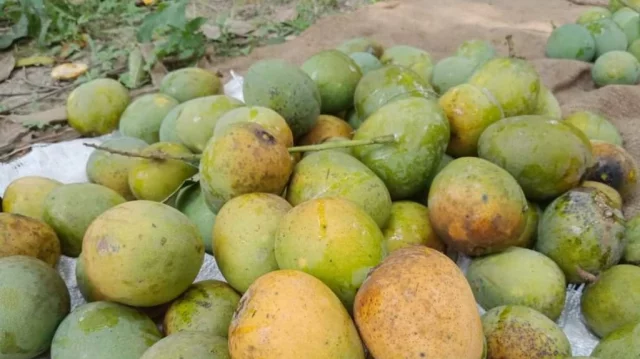Correspondence from Easter Region Under the blazing sun of Southeast Ghana, mango farmers fight an unrelenting battle against fruit flies and mealybugs.
But a recent study reveals that the chemicals they depend on for survival may be slowly poisoning them, their families, and the very land they cultivate.
Dr. Kwaku Adu of the Department of Applied Economics, University of Environment and Sustainable Development, Somanya, has uncovered startling evidence: while pesticides safeguard mango yields, their misuse is leaving dangerous scars on health, food safety, and the environment.
This was contained in his recent publication entitled “Knowledge, attitudes, and practices of mango farmers on the harmful effects of pesticide use in Southeast Ghana’, published by Cogent Food and Agriculture.
The study, which surveyed 112 mango farmers across Shai Osudoku, Yilo Krobo, Lower Manya Krobo, and Upper Manya Krobo, paints a worrying picture.
Fewer than thirteen percent (13%) of farmers were aware of the environmental consequences of pesticide use, and just over twelve percent wore protective gloves during spraying.
More than sixty percent (60%) disposed of empty containers by burning them or dumping them on their farms, a practice that contaminates soil and water.
The health consequences are already evident: farmers reported headaches, skin rashes, coughing, pneumonia, asthma, and even deaths linked to pesticide exposure. Despite these risks, the overwhelming majority of farmers, over ninety percent (90%) continue to rely heavily on pesticides, often without protective equipment.
This unsafe reliance not only endangers rural communities but also poses a serious threat to Ghana’s growing mango export industry. International markets, especially in Europe, enforce strict standards on pesticide residues, and the continuation of these practices’ risks damaging Ghana’s reputation abroad.
Dr Adu stressed that the problem is not simply ignorance but also economic and structural.
Larger households struggle to afford safety equipment, while weak regulation and limited training mean many farmers never learn about safer practices. “This is not just about saving mangoes,” he cautioned. “It is about saving lives, protecting ecosystems, and securing Ghana’s agricultural future.”
The study calls for urgent national action. It recommends that farmers should be given mandatory training before purchasing pesticides, that protective equipment such as gloves, boots, and masks should be made affordable through subsidies, and that safe community-based systems for the disposal of containers should be introduced.
It further highlights the importance of stronger enforcement to curb the sale of counterfeit and unregistered chemicals and encourages the adoption of integrated pest management and eco-certification schemes that reward sustainable practices.
Mangoes remain one of Ghana’s most promising export crops, but the hidden cost of pesticide misuse is becoming too great to ignore.
Protecting the health of farmers is not only a moral duty but also an essential step toward sustainable agriculture, environmental protection, and safe food for consumers at home and abroad.
Will Ghana pass the Anti-Witchcraft Bill? Find out in the latest episode of The Lowdown on GhanaWeb TV in this conversation with Amnesty International:








